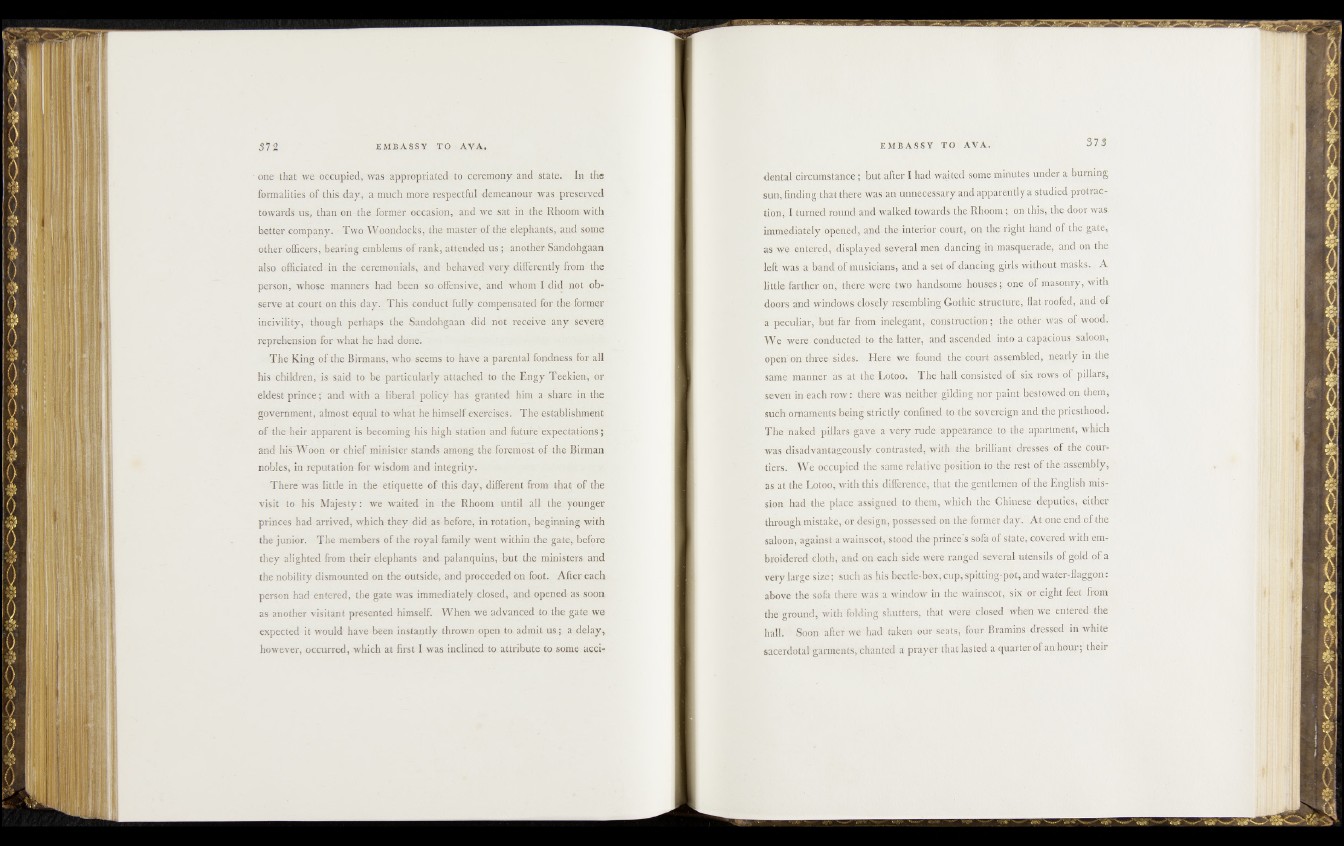
one that we occupied, was-.appropipatedista; ceremony and state. Ip the
formalities of this day,, a much, more ’respectful-demeanour was. preserved
towards us, than on the former occasion, and we sat in the Rhoom with
better company. Two Woondo.cks, the master oj the elephants, and some
other officers, bearing emblems of rank, attended u s ; another Saridohgaan
also officiated-in the ceremonials, and behaved very differently from the
person,, whose manners had been so offensive, and whom I did not observe
at court o n this day. This conduct fully compensated for the former1
incivility, though perhaps the Sandohgaan did not receive any severe;
reprehension for-what he had done.
The King of the Birmans, who seems to have a parental fondness: for all
his children, is said to be particularly attached to the Engy Teekien, or
eldest p r in c e a n d with a liberal, policy has granted him a share in the
government, almost equal to what he himself exercises. The establishment
of the heir apparent is becoming his high station and future expectations;
and ids Woon or chief minister stands among the foremost of the Birman
nobles, in reputation for wisdom and integrity.
There was little in the etiquette off this day, different from that of the
visit to his Majesty: we waited in the Rhoom until all! the younger
princes had arrived, which they did as before, in rotation, beginning with
the junior. The members of the royal family went within the gate, before
they alighted from their elephants and palanquins, but the ministers and
the nobility dismounted on the outside, and proceeded on foot. After each
person had entered, the gate was immediately closed, and opened as. soon-,
as another- visitant presented himself. When we advanced to,the -gate we
expected it would have-been instantly thrown open to admit u s ; a delay,,
however, occurred, which at first I was inclined to attribute to some ac.ei?
denial circumstance£> bdjb^ftejv I t e i n u t e s unjj^tt % l i n i n g
sun,findingsfet thejNwas Wtwpesssaary a>ti^g,pp^|^y-#is4udiedprotrpc-
tion; I tufiae# filowf ^ as>
a a wo eotered,ldii^j|.}^^?#yeral;|Rcnid^pAgfii^m;^<f{uerad^,' gw HmHu
left! was a band of njiu^imSns» amL* s tfoaLd hicumm.u K without,;nptsfcSfr . A,
little faithti on,.there were tw.bJtjn.dsoiniisJffiij^';:
doors and windo.wsdilopely r e g e m $ f t % p # u re, flat|r<|ofi|d,
a pecuhai, but fir fiojsariiicJ}-g^hl-eniistim l i onJ gt i f i cn
Wo were conducted- to the latter, and ia^em<ffd$i$fo> ’
open on> three sides.. Here we found) fet-^epbfcd, .pearly|jdhfhe
same manner 'amtati the.Lohoo* The halt coxtsis^dM s** rowsfJ(f|pilfo5s^
seien m each row : there was nmher gilding nor*paint; ltestowcd'on^thc'nr)
stichi ornaments being- strictly, confined
The naked pillars gave a very rudef|p®efoa!Bee) which
was disadvantageous^ contrasted, with the brilliant dresses of the courtiers.
We occupied the same relative position to the rest of the.'.assembly,
as at the Lqtoo, with this difference, that the gentlemen of the1 English mission
had the place .assigned to them, which the Chinese deputies either
through mistake,.or design, possessed.on the former day. At one end of the
saloon, against a wainscot, stood the prince’s sofa of state, covered with- embroidered
cloth, and on each side were ranged several utensils of gold of a
very large size; such as his beetle-box, cup, spitting-pot, and water-flaggon:
above the sofa there was a window in the wainscot, six or eight feet from
the ground, with folding shutters; that were: closed when we entered the
hall. Soon after we had taken our seats, fouriBi'amms-idressedi«m.whi'ffi
sacerdotal-garments,stented at praye-pthatslasted a'.quarterofiauiheuns'itheir